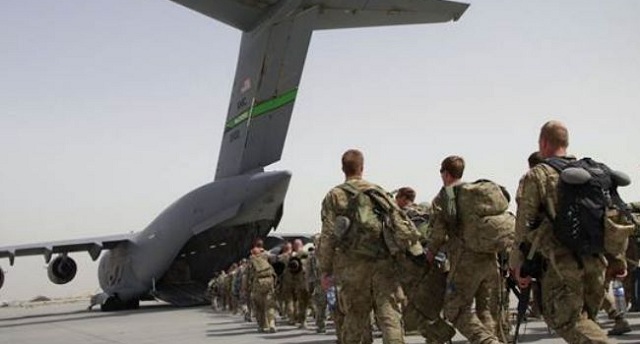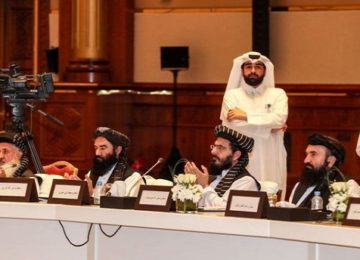May 12, 2019
Diligent minds in Pakistan pay adequate attention to the Indo-US strategic partnership across Asia. However, with this partnership as the framework, analysts may find it difficult to explain why the US began peace talks with the Afghan Taliban and negotiations on “when and how the US troops would exit the country”. Afghanistan was invaded to pursue key objectives of a long term geopolitical and strategic nature and not as a reaction to al Qaeda’s terrorism. The importance of it in those geopolitical and strategic terms to the US has not died down, and has only increased under the rubric of the new Indo-US alliance. In this scenario, should Pakistan realistically expect a US withdrawal from Afghanistan?
Afghanistan’s geographical and geopolitical placement is useful for the US to keep an eye on rival Iran, semi-rival Pakistan and rivals China and Russia. The difficulty of one side conclusively winning the war there also means continuous excuse for the military industrial complex in the US to win large contracts to supply the war effort. With respect to the Indo-US alliance, Afghanistan is a vital place for India to attempt to destabilize Pakistan using its “proxy partners” such as Baloch separatists. India has invested massive sums in a sprawling network of infrastructure projects in Afghanistan as well, featuring schools, dams and roads linking all the major urban centres, where India intends on dominating the market with exports.
Needless to say, the presence of India’s key ally and superpower USA in Afghanistan may be vital to ensuring the safety of New Delhi’s investments. However, Afghanistan also has a certain use for the US, independent of its alliance with India, which is of extreme importance: opium and the drug trade.
The sale of massive amounts of opium grown in Afghanistan, with opium growth registering a huge upturn since the US invaded in 2001, allegedly produces vast amounts of off-the-books money for the US intelligence agencies to use in their covert operations worldwide. According to various reports, this opium is transported to drug cartels abroad in exchange for money, through infrastructure and actors often exposed as being fronts for the CIA (such as the famous case of CIA-controlled Air America in Laos and Vietnam), which has never been part of the legitimate financial system and thus which is difficult to trace back to its illegal source.
Considering the extent of CIA’s involvement throughout the world in wars, regime change operations and so on, it is hard to imagine it would abandon Afghanistan and the strategic usefulness of the opium trade. The amount of land in Afghanistan used to cultivate opium has also risen significantly under the watch of the NATO forces. The US ceding it via a military withdrawal from Afghanistan to rival players in the region is also difficult to imagine.
The US invasion of Afghanistan also sought to achieve objectives in another important geopolitical and geo-economic power struggle: the monopolization of the Caspian Sea’s oil and gas which the US – driven by Israel’s potent lobbying on Capitol Hill – did not wish Iran to profit from.
The Israel Lobby-authored Iran Libya Sanctions Act (ILSA) of the mid 1990s targeting companies investing above a certain amount in Iran’s oil and gas sector sought to deter multinational oil companies developing Iran’s oil and gas fields. ILSA also sought to stall the development of an efficient and popularly-supported pipeline from the Caspian Sea across Iran to the Arabian Sea for onward trade with the world.
Alongside these efforts to ensure that Iran – a state with which Israel remained at odds due to its support for the Shia Lebanese resistance to Israel’s occupation in Lebanon (1982-2000) – did not constitute the point at which the coveted Caspian energy supplies would terminate at warm waters for shipping, geo-economic ploys were underway to ensure it did not monopolize the growing Asia market either.
To this end was planned a rival pipeline taking Caspian energy supplies to the broader Asian market promoted by the US. The populous and increasingly energy-hungry markets of Asia – especially China and India – would have acted as a major source of profit for Iran had its gas and oil fields in the Caspian been utilized and thus the rival pipeline was planned to begin at Turkmenistan’s Caspian gas fields and leave out Iran altogether.
The Turkmenistan-Afghanistan-Pakistan-India (TAPI) gas pipeline had been supported by the US since 1998 and acted as the motivating factor behind the US doing diplomacy with the Taliban. The US even hosted the latter in Texas in 1997 at the headquarters of Unocal, the company seeking to construct the pipeline.
Technical issues causing the breakdown of the planned construction of the pipeline from Turkmenistan and across Taliban-ruled Afghanistan, the Taliban’s lack of international legitimacy and the Taliban’s ‘provocative’ opium production ban in 2000 would lead to the US invasion of the country. Former Unocal employee Hamid Karzai was made president of Afghanistan and Zalmay Khalilzad, who worked as a risk assessor for Unocal during the period it was striving for the pipeline which he also advocated heavily for via op-eds in the media, was made special envoy for Afghanistan.
The same Zalmay Khalilzad is the current US official responsible for managing the ongoing Afghan ‘peace talks’ which do not seem to give cause for much optimism or even cessation of hostilities on the ground. Iran-Israel and thus Iran-US tensions are also more heated than ever, sanctions and warmongering and all.
With this deep historical and modern geopolitical significance of Afghanistan, the Indian stake in Afghanistan and the appointment by the US of one of the original architects of the Afghan war to oversee ‘peace talks’, should Pakistan realistically expect US troop withdrawal from Afghanistan anytime soon?
The author, Agha Hussain, is a Research Analyst at the Institute of Regional Studies, Islamabad, Pakistan, as well as an editorial contributor to the websites Eurasia Future and Regional Rapport. His writings have a particular focus on Middle Eastern affairs and history and Pakistan’s foreign policy. He can be reached at @AghaHussainReal
Source: CRSS Blog.








